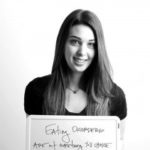Peer Support for Eating Disorders: Does it Work?
Contributed by Kristina Saffran, Executive Director, Project HEAL, and Grace Patterson, Director, Communities of HEALing
Project HEAL has grown tremendously over the past few years, primarily due to the grassroots growth of our chapters – people from all over the country at different stages of eating disorder recovery.
Seeing our potential to make a more significant impact, we knew we had to expand our mission, but first, wanted to get insight from our community on what they really needed in recovery.
We spent last fall conducting interviews with 50 diverse chapter members about their desires in recovery.
At the end of that listening tour, we heard loud and clear that our community wanted mentorship. But, we had to ask ourselves “will it actually help?”
Sharing Personal Experiences
We know peer support makes a difference for substance abuse recovery, managing other mental health challenges, and improving quality of life for those with chronic illness [1].
We also know from personal experience that building relationships with other people who understand what you’re going through in eating disorder recovery can be life-changing.
A big part of the reason Kristina and Liana founded Project HEAL is that they had no role models to look up to who showed that full recovery was possible. They became each other’s support system and pushed one another to get better.
Communities of HEALing
Grace, too, had a compelling experience of informal peer support. And we’re not alone. Mentees in the Communities of HEALing program have told us that it’s “been a game changer,” that “finally getting ‘real life’ support and accountability” fills a gap between the skills we build in therapy and creating the kind of meaningful life we grow day by day in recovery.
We decided to build Communities of HEALing because our community told us that it is necessary and essential. But as we grow this program, we have a responsibility not just to respond to that need, but to make sure that the thing we think will work actually does.
The expansion of research on eating disorders in the last decade has yielded incredible insight.
We’ve learned that that neurobiology and genetics are a significant contributor [2], that family support is crucial, and that technology can lead to better outcomes in treatment [3].
But despite all of this learning, no significant research has been done on peer support for eating disorders. We’re about to change that.
During this phase of the Communities of HEALing program, we’re partnering with Columbia University’s Center for Eating Disorders to conduct a randomized controlled trial of COH program participants.
Providing Feedback on Progress
Mentees in the program will fill out a form each week keeping our research team up to date on how they’re doing, and when the study is finished, we’ll be able to look at the big pictures of all of the data collected to understand if and how the program is working.
What do we mean by “working”? In truth, we mean a number of things. Most obviously, we want to see if having a mentor reduces participants’ use of eating disorder behaviors.
We’re using a measure called the Eating Pathology Symptoms Inventory to measure reductions in 8 areas: Body Dissatisfaction, Binge Eating, Cognitive Restraint, Purging, Restricting, Excessive Exercise, Negative Attitudes Towards Obesity and Muscle Building.
But we don’t just think of recovery as the use of behaviors. We also want to understand if participants feel that their quality of life is improved by having a mentor.
Here, we’re using the Eating Disorder Quality of Life Assessment to look at the impact of their eating disorder on psychological, physical, cognitive, financial, and work/ school domains.
Peer Support
Finally, relapse is a big problem in early eating disorder recovery, so we want to see if participating in this program reduces relapse, hospital readmissions, and traditional treatment utilization.
This first study on Communities of HEALing is just the beginning–we expect that it will initiate avenues of research that have never been explored before, looking in part to people in recovery to show us what we need to learn next.
For us, Communities of HEALing is about building a network of recovering people who are dedicated to supporting those in early recovery, backed by the best practices and evidence-based approaches that will help them do it well.
We are committed to building a program that truly makes peer support work for eating disorder recovery.
To get support in your recovery, and help us learn about the kinds of support that work, you can enroll to be a mentee in the program. For more information, check out our website.
To dedicate your time to support those in early recovery, whether you have personally experienced eating disorder or not, you can apply to be a mentor.
We are so excited to build with you.
About the authors:
Kristina Saffran is the co-founder and executive director of Project HEAL: Help to Eat, Accept and Live: the largest non-profit in the US delivering prevention, treatment financing, and recovery support to people suffering from eating disorders. Kristina and her cofounder Liana started HEAL at 15 years old in recovery from anorexia; they now have 40 chapters across the globe and have become the premier voice of recovery, with over 30k followers on Facebook and Instagram. Kristina was named a 2017 Forbes 30 under 30 social entrepreneur, and has been profiled in The New York Times, Fast Company and People Magazine. She’s spoken across the country –Stanford Medical School, Harvard College, The International Conference of Eating Disorders, and more – on eating disorders, recovery, and launching a successful social entrepreneurship as a teen. Kristina graduated from Harvard College with a bachelors degree in psychology in May of 2014.

Liana Rosenman is a co-founder of Project Heal. Project HEAL: Help to Eat, Accept and Live (www.theprojectheal.org) is a 501(c)3 not-for-profit organization that raises money for people with eating disorders who are not able to afford treatment, promotes healthy body image and self-esteem, and encourages all people to believe that full recovery from an eating disorder is possible. The founders of Project HEAL, Liana Rosenman, and Kristina Saffran, met while undergoing treatment for anorexia nervosa when they were just 15 years old. Liana currently works as a 5th grade NEST teacher in New York City and is earning her master’s degree in Special Education at Hunter College. She believes an education should empower a child and help him or her make a positive contribution to our world.
Grace Patterson is the Director of Communities of HEALing, Project HEAL’s brand new pilot program that connects those new in recovery to support and mentorship. An accomplished trainer, organizer, and strategist, Grace has supported hundreds of leaders in more than 15 countries, helping to develop their skills in intercultural engagement, strengthen their theories of impact, and effectively communicate their visions. Grace brings both her professional experience in program management and training, as well as her personal experience of the transformative power of being in community with those working toward active recovery from an eating disorder, to her work training the amazing Peer Mentors of Communities of HEALing.
References:
[1] Repper J, Carter T. A review of the literature on peer support in mental health services. J Ment Health. 2011;20(4):392-411. doi: 10.3109/09638237.2011.583947. PubMed PMID: 21770786.
[2] Kaye, Walter. “Neurobiology of anorexia and bulimia nervosa.” Physiology & behavior 94.1 (2008): 121-135.
[3] Lock, James et al. “Randomized clinical trial comparing family based treatment to adolescent focused individual therapy for adolescents with anorexia nervosa.” Archives of general psychiatry 67.10 (2010): 1025–1032. PMC. Web. 19 Oct. 2016.

